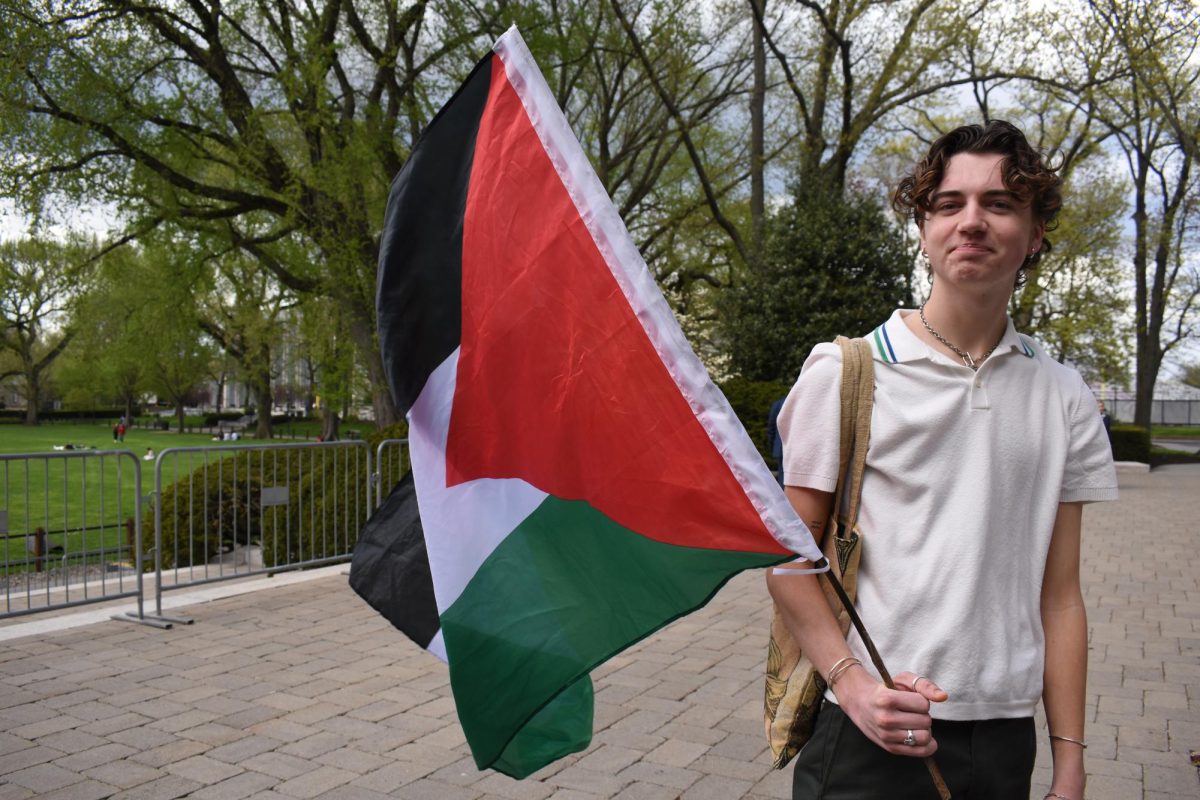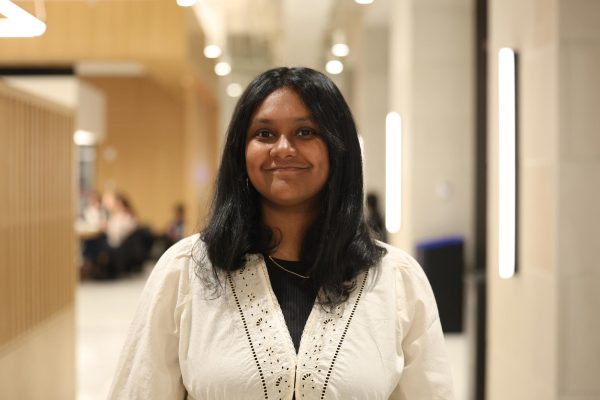On April 24 and 25, one week before Fordham Students for Justice in Palestine (SJP) organized an encampment at Fordham University Lincoln Center, SJP and the Fordham Palestinian Solidarity Network (PSN) launched two demonstrations at both Fordham campuses. On Wednesday, April 24, the two clubs jointly held a teach-in on the Keating Hall terrace which drew around 100 attendees and featured a variety of student and alumni speakers. On Thursday, April 25, they held a rally outside the Leon Lowenstein Center’s main entrance, which again featured student, faculty and alumni speakers and drew roughly 200-300 attendees.
On April 24, a teach-in was announced by the PSN, scheduled to take place at 3 p.m. on the steps of Keating. However, before the teach-in began, barricades were placed at the top of Keating steps, restricting the group to the terrace overlooking Edward’s Parade. A significant administrative presence was noticed throughout the teach-in, including Vice President of Marketing and Communications Justin Bell, Vice President of Student Affairs Michele Burris and Assistant Vice President and Dean of Student Services Keith Eldredge, who notably made the decision to unauthorize Fordham SJP in 2017, resulting in a lawsuit and leaving SJP as an unofficial club.
Abdo Yousef, FCLC ’22, a Palestinian and member of SJP during his time at Fordham, gave the first speech recounting Fordham SJP’s history.
“In light of what’s happening in Gaza, with the people in Gaza — my family, who have been expelled from Jaffa and sent to Gaza, people who I have never been able to meet… because of their deaths, we must focus on what’s going on now,” Yousef urged.
Yousef detailed the efforts of Ahmad Awad, FCLC ’17, a Palestinian-Polish student, to create Fordham SJP — a club with the goal of Palestinian education and solidarity. After a year of planning and formation, Fordham Lincoln Center’s United Student Government approved the club.
“For the first time in Fordham’s history, Dean Eldredge vetoed the decision and the club was no longer to organize under the reason that the club was ‘too polarizing’ to be present at Fordham University,” said Yousef.
SJP sued Fordham, and for four years, the two parties engaged in a legal battle over SJP’s right to be established at Fordham. Awad et. al v. Fordham University details the four-year legal struggle that emerged, resulting in an initial victory for SJP that was overturned in a trial court a year later in Fordham’s favor — a decision that Yousef alleges was awarded on a technicality.
“For four years, going through [COVID-19], while they cut funding for faculty, while they cut funding for the people who run Fordham, they put money into this court case to continue to pressure students to stop their pursuit for an SJP,” Yousef said.
Yousef also recounted conversations with the current administration about SJP.
“I myself last semester had the opportunity to talk to President [Tania] Tetlow in hopes that with a new administration, we were able to maybe jump over some hurdles and try and get our cause understood, but we were not met with understanding,” Yousef said. “Instead we were met with accusations, with claims that we had never made one being that we believe in violence on campus and our issues were belittled.”
Yousef recalled speaking about losing family members since Oct. 7, 2023, to President Tetlow, and he said Tetlow likened Yousef’s losses to her experience going through Hurricane Katrina. Remarking on the celebration kickback behind the teach-in, he said, “It just goes to show how easy it is to forget, to experience cognitive dissonance to people actually dying.”
He concluded by emphasizing SJP’s calls for boycotting and sanctioning, explaining that divestment and financial transparency are goals that SJP has for Fordham.
Stizzy Demacopoulos, FCRH ’24, spoke next on the environmental devastation and injustice caused by the war in Gaza.
“Environmental injustice is intrinsically intertwined with the occupation of Palestine. Zionism uses colonization as an instrument of nation-building. Settler colonialism is inherently destructive of any environment,” Demacopoulos said.
Demacopoulos reiterated the scale of destruction of Palestinian land and resources by Israel, as well as the deaths, destruction, and loss faced by Palestinians since Oct. 7. They reiterated Palestinian rights to “land sovereignty and environmental wellbeing.”
“Israel is currently releasing white phosphorus, which burns down to the human bone upon contact. White phosphorus has environmental effects that are long-term. Without oxygen, white phosphorus remains in the soil for years, polluting water sources and accumulating in fish,” Demacopoulos said.
Other student speakers reflected on the Jesuit history of activism and reiterated the values of education, collective liberation and continued action.
“Here’s to a free Palestine,” concluded a student who did not reveal their identity, “which is inextricably connected to a freer existence of yourself, of others and of all oppressed people around the world.”
Members of the administration and residential life stood at a close distance observing the teach-in for most of its duration. When asked about their reasons for attending, Bell replied he was there to keep students safe and Burris declined to comment.
On Thursday, April 25, Fordham SJP, PSN and the Fordham Law National Lawyers Guild held a rally outside Lincoln Center’s Lowenstein building. In the hours before the event, SJP had their Instagram account, @fordhamsjp, suspended.

The rally drew roughly 200-300 attendees and a variety of speakers including faculty, law students, alumni and undergraduates. Barricades were placed in front of the stairs leading to Lowenstein Plaza and on the street, keeping protestors to the inside of the sidewalks. Both Public Safety and the New York Police Department were present.
The rally was scheduled for 11:30 a.m. and went on for roughly two hours. Key speakers included an unidentified faculty member who announced the forming of Fordham Faculty for Justice in Palestine (FJP). Reading from a collectively generated statement, they said, “As a Jesuit institution, we call on Fordham to honor its commitment to the spirit of inquiry, reconciliation, justice and dialogue by protecting free speech on campus and ensuring access to spaces where our community can collectively advocate for justice in Palestine.”
The statement currently has over 180 signatories, and FJP also spoke at the SJP sit-in held on May 3.
Several law students spoke at the rally, including one speaker of Palestinian descent who recounted her loss of 51 family members since Oct. 7.
“I stand before you not just as a student, but as a sprouted seed from the soil of Gaza,” she began. “This October the world watched, or perhaps turned away, as another chapter of agony unfolded in Gaza.”
“We advocate for more than just recognition. We seek true justice. We call for more than mere attention. We demand decisive action,” she said.
The law student recounted numerous family members due to the war on Gaza.
“This is for children like my seven-year-old cousin Eli, who paddled his bike towards what he believed was freedom only to be silenced by a bomb,” she said. “For me, losing 51 family members has been a painful reminder of the cost of complacency. We must be compelled to act, for action today indeed sanctions the suffering of tomorrow.”
Other student speakers recounted action at other encampments in the city, expressing solidarity with their movements and a goal to push Fordham for divestment.
“I have been living at the New School encampment as of Sunday. I am here to remind you that the students hold all the power,” said an undergraduate.
“President Tetlow, your silence has spoken volumes, and Fordham University, shame on you,” she said, to echoes of “shame” from the audience.
“We stand unequivocally with our comrades across the U.S., building encampments and standing up to their universities,” said another student.
“At the same time, we demand from Fordham University divestment, disclosure and for Fordham to call an immediate ceasefire in Gaza today.” She then led the audience to point to Lowenstein and chant, “We want justice, you say how? / Fordham, divest now.”
Unidentified SJP leaders offered concluding statements, urging for financial transparency of Fordham’s assets, many of which are undisclosed. Before they spoke, Fordham representatives urged them off the concrete platform and onto the sidewalk.
“Almost all of Fordham’s investments are undisclosed,” one leader began. “We need to know where that money is going.” They distributed handouts showing companies that Fordham holds assets in through the Student Investment Management Fund, including Google and Exxon-Mobil.
“I want to personally say thank you to every single one of you,” another SJP leader said. “It is because of you that we can show this administration that they are silencing their students. All of you stand here in support of PSN and SJP and all of the Palestinian coalitions at Fordham.”
“Our Instagram actually got suspended this morning. We made a backup account that got suspended within an hour. It is because of your power, your willingness to fight that we are here,” they said.
Towards the end of the rally, counterprotesters holding an Israeli flag stood facing the divestment rally. The rally dispersed peacefully, breaking up into smaller groups that left slowly. Fordham did not comment on either the teach-in or divestment rally.









































































































































































































